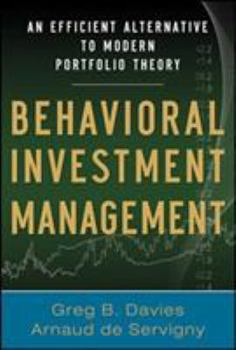Behavioral Investment Management: An Efficient Alternative to Modern Portfolio Theory
The End of Modern Portfolio Theory
Behavioral Investment Management proves what many have been thinking since the global economic downturn: Modern Portfolio Theory (MPT) is no longer a viable portfolio management strategy. Inherently flawed and based largely on ideology, MPT can not be relied upon in modern markets.
Behavioral Investment Management offers a new approach-one addresses certain realities that MPT ignores, including the fact that emotions play a major role in investing. The authors lay out new standards reflecting behavioral finance and dynamic asset allocation, then explain how to apply these standards to your current portfolio construction efforts. They explain how to move away from the idealized, black-and-white world of MPT and into the real world of investing--placing heavy emphasis on the importance of mastering emotions.
Behavioral Investment Management provides a portfolio-management standard for an investing world in disarray.
PART 1- The Current Paradigm: MPT (Modern Portfolio Theory); Chapter 1: Modern Portfolio Theory as it Stands; Chapter 2: Challenges to MPT: Theoretical-the assumptions are not thus; Chapter 3: Challenges to MPT: Empirical-the world is not thus; Chapter 4: Challenges to MPT: Behavioural-people are not thus; Chapter 5: Describing the Overall Framework: Investors and Investments; PART 2- Amending MPT: Getting to BMPT; Chapter 1: Investors-The Rational Investor; Chapter 2: Investments-Extracting Value from the long-term; Chapter 3: Investments-Extracting Value from the short-term; Chapter 4: bringing it together, the new BMPT paradigm; PART 3- Emotional Insurance: Sticking with the Journey; Chapter 1: Investors- the emotional investor; Chapter 2: Investments- Constraining the rational portfolio; PART 4- Practical Implications; Chapter 1: The BMPT and Wealth Management; Chapter 2: The BMPT and the Pension Industry; Chapter 3: The BMPT and Asset Managemen




